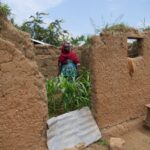
Displaced people in Mayo-Tsanaga, Logone-et-Chari, and Mayo-Sava divisions of the Far North region of Cameroon are forced to cultivate low-quality, marginal land due to their inability to access arable farmland, the Norwegian Refugee Council (NRC) has found. Many people are subjected to precarious living conditions, such as living with host families or residing in makeshift shelters. Women, however, bear the brunt of this crisis. Due to entrenched discriminatory customs, they are often denied access to land ownership, making it difficult for them to sustain their families or achieve economic independence.
“Displaced populations have no choice other than to farm on marginal, poor quality land, without legal security or protection against forced evictions,” said Elena Vicario, NRC’s Country Director in Cameroon, in a report on Wednesday, Dec. 18th. “Women in particular are stripped of their property and land by members of their own family, a common practice that must be tackled to ensure inclusive and equal opportunities for all.”
A survey conducted by NRC in these divisions revealed that more than 50 per cent of displaced households in the region do not own or have access to housing, land, or property. Of those surveyed, 98 per cent of women respondents reported having no access to these essential resources. This underscores the broader gender inequality in land ownership and tenure rights in Cameroon’s Far North, where customary laws continue to favor men over women in matters of property and inheritance.
“If we had land, we could farm and be able to take care of our children. We wouldn’t have to live on camp distributions. But without the land, you can’t do all that,” said Rifkatou, a female refugee living in the Minawao refugee camp with her four children, in the NRC report.
The legal landscape governing access to land in Cameroon is fraught with complexities. While land titles are the only recognised form of land ownership under national law, most properties in the Far North are not formally registered. Instead, informal land tenure systems governed by local customs prevail. Women, in particular, face discrimination within these customary systems, as men are traditionally regarded as the primary landowners.
Between January and September 2023, 70 per cent of housing, land, and property rights disputes in Cameroon’s Far North involved women, most of whom were displaced heads of household, according to the United Nations Office for the Coordination of Humanitarian Affairs (OCHA). The disputes often stem from women’s attempts to reclaim or secure land, which is regularly met with resistance from male family members or landlords.
The inability to access fertile land has severe implications for the food security and livelihoods of displaced communities. Farming is a primary source of livelihood in the Far North, but displaced people’s access to farmland is constrained by ongoing violence, the destruction of crops, and land disputes. The NRC report notes that displaced communities face numerous obstacles, including forced evictions, inflated rental fees, and the allocation of land without proper documentation.
This problem is exacerbated by the destruction, burning, and looting of homes, crops, and livestock. According to OCHA, 4 in 10 displaced people in the region have seen their homes destroyed, and 78 per cent of households require urgent support to access adequate housing.
“Access to land is essential to ensure people can produce food for themselves and support their families,” said Vicario. “Alarmingly, these rights are very often not respected, leaving people struggling. Both local and national authorities must act to protect the land rights of internally displaced persons and refugees, particularly women, and to ensure equitable land management.”
The NRC has called for urgent action from local and national authorities to address the ongoing crisis.
“NRC calls for immediate action by the local authorities to find lasting solutions to this land crisis, by creating a better protection framework related to rental arrangements. This will support the resolution of housing, land and property disputes and improve women’s ability to enjoy their right to access land,” added Vicario.
The NRC has also appealed to international donors to increase support for housing, land, and property rights programmes. By integrating land access and housing initiatives into broader humanitarian responses, such as shelter, food security, and livelihoods programs, donors can prevent evictions and exploitation while strengthening the safety and resilience of displaced communities.
Cameroon’s Far North region is home to more than 573,000 people displaced by violence and natural disasters, including internally displaced persons (IDPs) and refugees from neighbouring Nigeria. The region’s proximity to Boko Haram’s strongholds has left many communities in a constant state of insecurity, further limiting access to essential social services like health care, education, and water.
“It is crucial that the rights of displaced people are protected, and that concerted efforts are made to enable them to access arable land, rebuild their lives and regain dignity,” said Vicario.
Displaced people in Cameroon’s Far North, unable to access arable land, are forced to farm on poor-quality plots. The Norwegian Refugee Council highlights that women, in particular, face significant challenges due to discriminatory customs that prevent them from owning land, impacting their economic independence. A survey revealed that over 50% of displaced households lack access to housing, land, or property, with 98% of women reporting no access to these essential resources.
The region’s complex land tenure system, dominated by informal customs favoring men, exacerbates gender inequality in land rights. Disputes involving women, mainly displaced women, constitute 70% of land-related conflicts. The lack of access to fertile land affects food security, as displaced people struggle with forced evictions, violence, and land disputes. The Norwegian Refugee Council urges local and national authorities, as well as international donors, to protect land rights and support housing and land initiatives to aid displaced communities.
